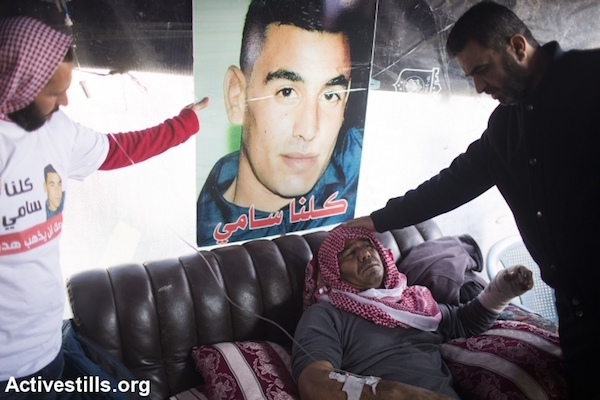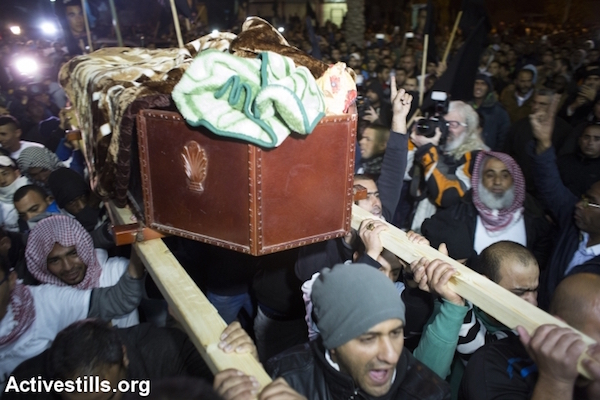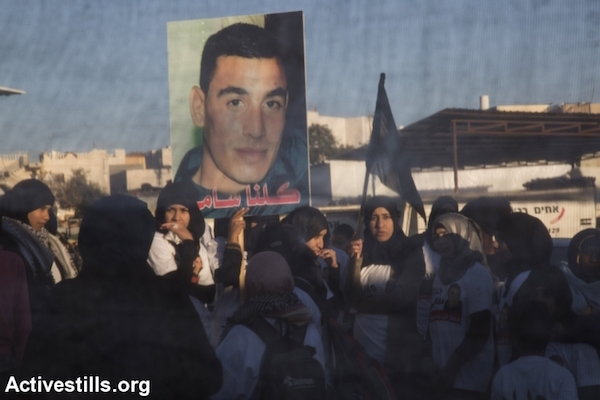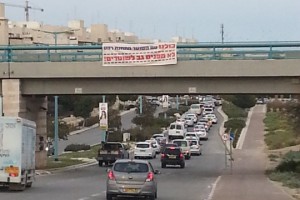When Khaled al-Ja’ar called the police to report drug dealers in his neighborhood, he never thought they would kill his son. Now he is turning to Israel’s top court to demand that his son’s killer, who has since been released and put back on the job, be arrested and prosecuted.
By Michal Rotem
(translated from Hebrew by Ofer Neiman)

When Khaled al-Ja’ar alerted the police to drug activity taking place in the Negev city of Rahat, he never imagined the night would end with him being severely beaten, handcuffed and humiliated at a police station, several minutes after watching his son die in front of him. Now he is appealing to the Israeli High Court of Justice, demanding that the officer who shot his son be rearrested, and that the officers who assaulted him be interrogated.
On Wednesday, January 14, during a police raid in neighborhood No. 26 in Rahat, an officer from the Rahat police used his side arm to shoot to death Sami al-Ja’ar to death, a 22-year-old man on his way home from work. About a month later, on February 12, the officer admitted his involvement in the shooting and was arrested for the purpose of interrogation, but released to house arrest a short while later. Two weeks ago, Sami’s father, Khaled, petitioned the High Court of Justice asking for an order nisi, via Adv. Shmuel Zilberman. Khaled is demanding that the officer suspected of killing his son be rearrested until the end of legal proceedings, thereby cancelling his release. In addition, he is demanding that all the officers suspected of assaulting him be interrogated and/or arrested. The petition was filed with the High Court, but while hearings of this type are usually scheduled within a few days, a date for the hearing of this petition has yet to be set. Meanwhile, the officer who killed Sami is back on the job.
The killing of al-Ja’ar triggered a sequence of events from which Rahat is still reeling, but this is just one part of the horrifying story that follows, and has now been revealed in the petition and in our conversation with Khaled al-Ja’ar. Another part of the story involves the violent and racist abuse of Khaled, a former professional soldier in the IDF, whose family lost a son in the 1973 war. Khaled was severely beaten and humiliated at the police station while handcuffed, minutes after watching his son dying in front of him. “Disturbances of public order” — that was the term applied to the events that took place after Sami was killed. But when “order” looks like what we are about to describe, those who violate it may not be the biggest criminals in the story.
The Case

According to his detailed testimony included in the court petition, on the night of the killing Khaled was sitting in his house when he heard shouting from the direction of the school, situated across the road — the target of the police raid. A short while earlier it was he who had alerted the police to the drug dealing taking place in the neighborhood, asking them to take care of it. As the raid was taking place, he saw a policeman seizing his son Sami and hitting him on the forehead with the butt of his gun. Al-Ja’ar then approached the officer and told him that his actions were illegal. In response, the officer hit al-Ja’ar with the gun on his left cheek and told him to leave the scene. In response, al-Ja’ar pushed the officer, defending himself against the assault coming from the former. The officer fell down, cocked his gun, aimed it at al-Ja’ar’s head and told him to leave the scene.
Al-Ja’ar left the scene and began to walk back to his house, but after a few steps he heard two gunshots. The shooting went on and intensified, and shouting was heard in the background, with the residents of the house crying. Two members of the family later testified that the gunshots were aimed at Sami, by an officer who came near the house fence, in contrast to the officers’ mendacious claims that they had only shot in the air.
But the officers present at the scene were not the only ones who lied. Police Commissioner Yoram Levy, commander of the Israeli Police’s Southern District, was quoted as saying that “Sami al-Ja’ar was arrested when he was in a car with drug dealers and was one of the detainees that night. The mob tried to free them, and the officers, who heard shooting in the area, felt threatened. The incident posed a risk to the officers’ lives, and they implemented a getaway procedure during which they fired shots in the air.”
However, Sami al-Ja’ar was not in the car and had nothing to do with the incident, and the shooter was not under any threat to his life.

The petition recounts how right after the shooting, Sami, having been shot in the stomach, reached the entrance to his house with tears in his eyes, apparently from tear gas used at the scene. He was taken by a relative to the medical center in Rahat, despite attempts by police to block their path, but it was too late. Sami died a short while later.
Detectives from the Rahat station also arrived at the scene. Khaled turned to them and said: “You killed my son.” In response, one of the officers told the others: “arrest him, he hit us.” They arrested Khaled, handcuffed him behind his back, put him in the police van. They made sure to send away the driver, Staff Sgt.-Maj. Aqef el-Huzayel, apparently because he is Bedouin. He was replaced by an officer named Itzik who told Khaled: “You broke my watch which costs NIS 5000 [$1,250], I’ll show you.” One man lost his watch, the other lost his son, but it was the one who had lost a watch who decided he needed to “show” something. With the help of his five friends, he would, indeed.
Read also: Kafr Kanna isn’t Ferguson, it’s much worse
Khaled al-Ja’ar was taken to the police station. He was then taken to the building where the detectives’ offices are situated, and there, Officer Itzik and five additional officers shackled his legs (in addition to the handcuffed), and he was beaten all over his body, including his testicles, by all the detectives in the room, using the butts of their guns, according to the petition. His left arm was broken as a result of the beating. Throughout the beating, the officers cursed al-Ja’ar, calling him “Hamasnik” and “Palestinian,” as well as spitting on him.
Al-Ja’ar recounts that he begged the officers to stop abusing him, but the beating went on. According to the petition, he collapsed to the floor, but even then, the beating, the abuse and the humiliation continued for about 15 minutes, until a Magen David Adom medic entered the room and tried to administer aid. The officers tried to get the medic out of the room, but the latter objected, and finally managed to have al-Ja’ar evacuated to the Barzilai Medical Center in Ashkelon, where his arm was put in a cast. Al-Ja’ar remained in custody for three days, until Sami’s funeral. He was released under restrictions only thanks to Talal al-Krinawi, the mayor of Rahat who asked to release him and posted his bail.
Interview with Khaled al-Ja’ar:
So far, not one of the assaulting officers has been arrested, even though el-Jaar managed to identify several of them. The police explained to al-Ja’ar that the officers had not yet submitted their activity reports, and he was not allowed to identify them in a police lineup. This should come as no surprise, especially in view of the way in which the Police Investigations Unit [in charge of investigating the conduct of officers] has functioned in cases of this type. The unit recently closed another case of violent abuse without any indictment. In that case, another resident of Rahat was also beaten after being handcuffed, and the officers even urinated on his head.
Why was the shooter released to house arrest?
On February 12, an officer in the Rahat police station admitted to involvement the shooting which killed Sami al-Ja’ar after a long period in which he denied any involvement. He was arrested the same night, but released the following morning, due to the absence of a report by Israel’s Abu Kabir Forensic Institute. After spending the weekend in a hotel, and following an appeal by the State Attorney, he was rearrested on February 14 for the purpose of interrogation. On February 17 he was released once more to a five days house arrest.
As early as January 21, sources in the Police Investigations Unit stated that there was suspicion of an unlawful shooting. By February 13, a month after al-Ja’ar’s killing and the autopsy, no forensic report had been submitted, and therefore the judge stated that it could not be proven that Sami al-Ja’ar had been killed by a bullet fired at him. Khaled al-Ja’ar added, during our conversation with him, that the representatives of the Police Investigations Unit told him there was a bullet, and that the bullet matched the officer’s weapon. However, even the officer’s admission that he had not fired in the air, along with the testimonies of other officers who were at the scene, did not suffice to keep an officer suspected of manslaughter under arrest.
As part of its coverage of the officer’s release to house arrest, the media reported threats to his life, and the commander of the Southern District had strong words to say about this, At this stage, according to Khaled al-Ja’ar, no one knew the identity of the officer who had shot Sami. While Sami’s father was immediately jailed for three days after the killing of his son Sami, the officer who shot Sami was initially only held for one day.
On Wednesday, the Israel Police Southern District Commander Yoram Halevy announced that the suspected policeman is back at work. With no indictment filed and the internal investigation ongoing, Halevy decided assigned the officer to a position in his own office.
Not all of us support the Rahat officer
The shooting that killed al-Ja’ar was an “unlawful shooting,” according to the Police Investigations Unit. Therefore, we would expect public support for the indictment of this officer after he killed an innocent citizen. However, this case involves a Jewish police officer who killed an Arab-Bedouin citizen, and therefore, the former enjoys support in the form of a Facebook group and posters calling on the public to stand by him.

There is no doubt that had the identities of the parties involved been swapped, with the shooting officer being Bedouin and the dead citizen an innocent Jew, residents of Beersheba would not see posters in support of the officer, or a Facebook group by the name of “We are all with the Rahat officer. And you? ” This analogy is of course hypothetical, because al-Ja’ar was the 49th Arab citizen killed by the Israeli Police since the year 2000, a police force that rarely shoots or kills Jewish citizens. This is just another example of the way in which the lives of Arab citizens in Israel are disregarded; reports about their killing by the police are met with complete apathy by the Jewish public in bad cases, and in even worse cases — with shows of public support for the killing officers.
Khaled al-Ja’ar says that as long as the High Court does not set a date for the hearing of his petition, he feels like he is losing his mind. He expects an apology from the district commander who claimed that his son, as well as he, were connected to the drug dealing activity in the neighborhood. He says an apology would relieve the pain to some extent.
Responding to the news that the officer who allegedly killed his son was back on the job, the al-Ja’ar family said it was shocked. The family said the move puts the officer one step closer to walking free and facing no punishment for killing their son.
In the face of police commanders who are trying to defame Khaled and his late son, in the face of a public which supports the shooting officer who killed his son, and in the face of a system which tends to close cases against police officers instead of indicting them, Khaled al-Ja’ar is calling on the public to join his struggle for justice for his late son and for his family (see this Facebook link), and he hopes that the High Court of Justice will set the record straight.
The Negev region police spokesperson issued the following response: “The events are under investigation by the Police Investigations Unit, and therefore we cannot address these questions before the end of the investigation.”
Michal Rotem works for the Negev Forum for Coexistence and is based in Be’er Sheva. This article was first published on +972’s Hebrew-language sister site, Local Call. Read it in Hebrew here.
